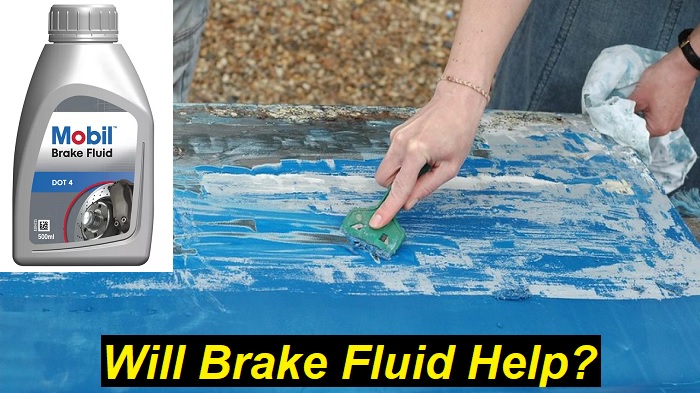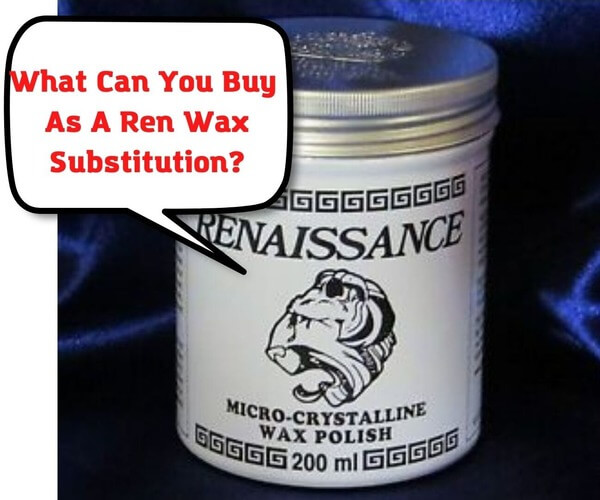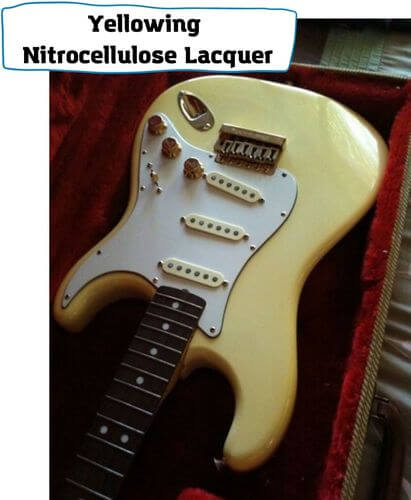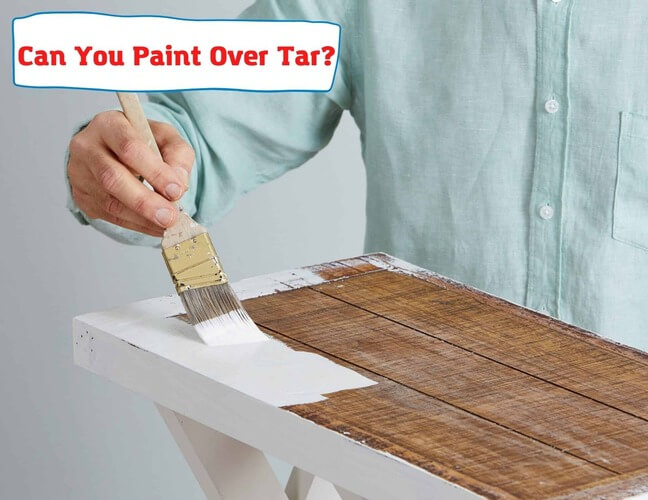When you need a little amount of paint remover, you usually don’t want to go to a shop and pay some money for a big bottle. Especially, if you aren’t going to need this material for a long time. So, people have always been seeking an available alternative that can easily be made just from some common materials and ingredients everyone has available.
We warn you that some kinds of paint will not be removed by any of the alternative paint removers we will offer in this article. But you can try and know for sure whether it will work in your case or not. We’ll focus on brake fluid as a paint remover, but we’ll also speak about some other alternatives.

Here’s what we’ll be talking about today:
- Can brake fluid actually remove paint?
- When is it a bad idea to use brake fluid instead of a paint remover?
- Step-by-step instructions for using brake fluid to remove paint.
- Some other alternatives of paint remover you can easily get.
Let’s get started!
Can brake fluid actually remove old paint?
If you are here to read about the magic of the brake fluid that can easily remove all kinds of paint, you’ve found the wrong place. Here, we try to figure out if it’s really effective and possible to replace the expensive paint remover with something else. And yes, the efficiency of all alternative materials that we’ll be talking about today will not be as good as the efficiency of specialized products.
But anyway, you can use brake fluid to remove small spots of old paint. It doesn’t mean that the fluid can easily destroy any kind of paint. We’ve checked it with the automotive paint and yes, it worked well.
Here are some things you should remember:
- it will take some time for brake fluid to destroy the hard layers of old paint or the clear coat – you will need to wait at least 5 minutes before trying to remove the old paint;
- you will need some more brake fluid than you can imagine – repeat covering the paint layer with brake fluid every five minutes to achieve better results;
- sometimes, it will take you hours to get the paint out of the surface because different paint types will act differently under this fluid;
- the more protected the paint, the more time you need, and sometimes, a good clear coat will save the paint from damage by brake fluid;
- if you are searching for an alternative material to remove a small amount of old paint, you can really try brake fluid, because it’s safe and available for every car owner.
So, the main advantage of using brake fluid as paint remover is that you can easily get this fluid in your garage. Even if you don’t have the bottle with some leftovers of this fluid, you can easily get a little of it in your car. But be careful – never take a lot out of the reservoir because you can have problems with braking after that.
Before you apply brake fluid to the entire project, check the reaction in a small spot. Some paint types will not react or it will take a lot of time to clean off the old paint. So, in these cases, you will need to find something better than just brake fluid. What else can you use? We’ll tell you later in this article.
Why does brake fluid work as a paint remover?
Brake fluid is a chemical that is aimed at giving pressure to all brake system units in your car. It has to be liquid at any temperature, it has to keep the same viscosity and chemical activity at all times. That’s why this fluid contains a lot of active chemical elements. They may be different and they depend much on the brand. But the common thing is that they all influence any paint and thin it.
Some spirits and other materials in the brake fluid will thin nearly any paint. Only some clear coats will stand the reaction. Although it’s not the most efficient way to remove some paint from many surface types, you can use it. We should warn you that if you need to remove paint from a big surface, using brake fluid is insane. It will be very long and inefficient.
So, we only recommend using brake fluid when you have a little project and no access to another type of paint remover or thinner. This way, you will save time and money. But remember that there are numerous disadvantages of using brake fluid as the paint remover.
What are the drawbacks of removing paint with brake fluid?
Every decision has its own pros and cons. If you are going to clean off a project car with old paint, you should buy a specialized paint remover. This will be the most effective decision in this case. But if you need to remove some paint from a toy car, for example, why not try and use some alternative remover like brake fluid?
Here are some problems you can get:
- Plastic parts may easily melt. Some types of plastic will actually be “thinned” just like the paint. So, the project may finish at this stage.
- You will spend a lot of time. Paint removers work really fast – just a minute or two will be spent. But alternative materials will need much more time.
- Also, cleaning off brake fluid is not that easy. It’s a greasy liquid that will remain on the surface even after using some spirits for degreasing and preparing the surface.
- Painting right over brake fluid is an insane idea. You will have to redo the project if you take this decision.
- It will take you some days to prepare the surface for the next stage of your project. And sometimes the preparation work will be very hard.
You may have heard that brake fluid works well with rust. It cleans off some rust from the surface. But the greasy liquid stays on the surface instead of rust and is really hard to clean off. So, you will have to paint over it or put some primers over it. This will result in your paint chipping off or cracking after you finish your project. And if you have some spirits to clean off the brake fluid, then why don’t you use these spirits initially to clean off the old paint?
What kinds of alternative paint removers can you use?
Now, if you thought that brake fluid is an ideal paint remover, now you can be thinking that you have to find some other alternative. Our suggestion – just go to a shop where they sell paint and ask them if they have some paint removers in spray or in very small bottles. Spray cans have a longer shelf life, so you can use them years after you buy them.
But if you still want to find some free paint removers, we’ll give you some ideas. But be careful – not all of them will be effective, and nearly any of them will actually be more effective than even the cheapest paint remover you can buy.
Here are some of our ideas:
- Baking soda. You will need to prepare kind of a paste using baking soda and a little water. Then, apply this paste and let it rest on the paint for a while. When you clean off the soda, it should come off with some parts of paint.
- Any cooking vinegar can actually work well as a paint remover. This is a good idea if you need to clean off a little paint from your project because vinegar will never harm any surface but paint.
- Be careful because this thing is toxic and needs some protection for you to use it. But bleach works pretty well with many paint types and can help you in removing some paint from your project.
- Laundry detergent. If you have some liquid detergent, it can help you in removing paint from a project. It will also need some time, it will not be very effective, but it’s better than nothing.
As you see, you can find a lot of things right at home that can help you remove some paint from any surface without damaging the surface itself. It’s not hard to use them – just apply some small amount and try to remove some paint. If you don’t succeed, try another option because different paint types work differently with your alternative paint removers.
Final words
Unfortunately, any of the mentioned above alternative paint removers will not be as efficient as even the cheapest paint remover from a shop. It will not cost you a lot of money, so you should choose a specialized option for your project. But if the project is not that important and you can risk and experiment, then you should try with some other options like brake fluid or something.
- Can You Unmix Paint: Techniques, Consequences, Alternatives - February 23, 2024
- Does Primer Need to be Mixed? Effective Primer Application - February 22, 2024
- How to Make Old Paint Usable Again: Retrieving and Preserving Paint - February 21, 2024



